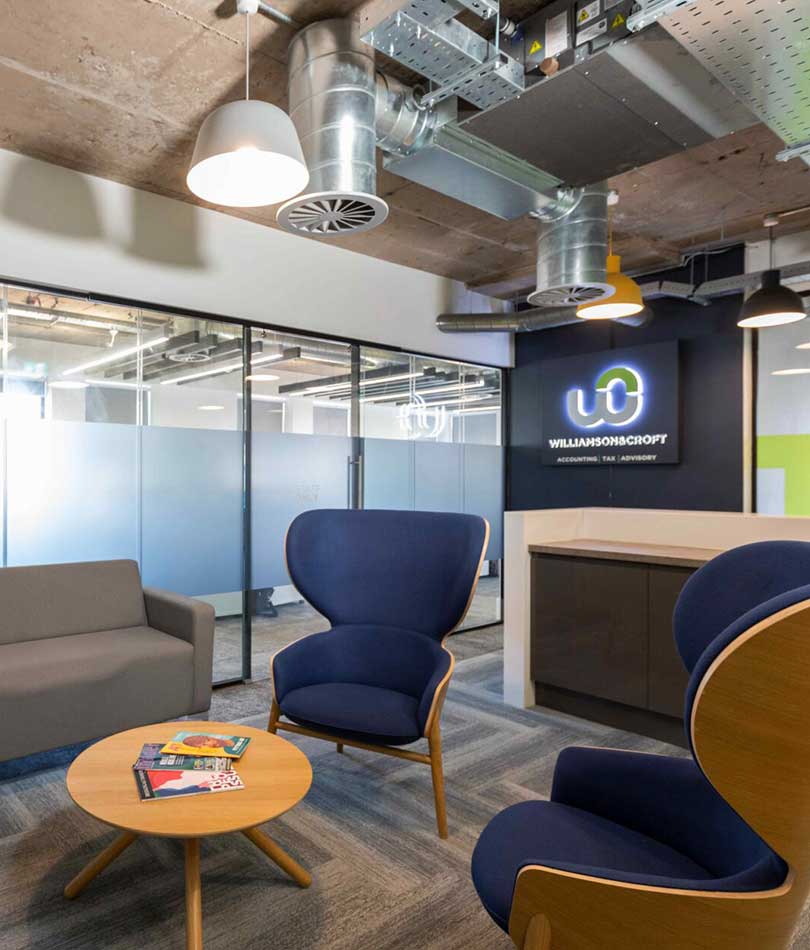Delivering maximum value to your business
R&D Tax Credits
Our expert R&D tax credit specialists help businesses claim between 8% and 33% of their research and development (R&D) costs back in tax credits. There’s no better way to advance your company and reward you for your business innovation.
From cutting-edge tech start-ups to established manufacturers, we’ve helped businesses in Manchester, Liverpool and across the UK claim thousands in R&D tax relief. Whatever sector you operate in, our expertise can turn your innovation into real cash benefits.
Innovate boldly, claim smartly.
Speak to one of our R&D tax specialists today at 0161 399 0121 or email us at info@williamsoncroft.co.uk to discover if we could help your business claim R&D tax credits.

Why Choose Williamson & Croft For Your R&D Claim
Don’t risk your R&D claim with inexperience. Choose Williamson & Croft’s R&D tax credit specialists for:
Proven track record: Our R&D tax consultants have a history of unchallenged and successful claims. We’re happy to provide references of past clients who have experienced windfall tax credits.
Expert compliance: Our R&D tax specialists ensure flawless CT600 submissions and bulletproof documentation, minimising HMRC enquiries and delays.
Maximised value: We meticulously capture every qualifying expenditure, optimising your R&D tax credit claim.
Tailored approach: No ‘one size fits all’ here. Our tax consultants customise our strategy to your business goals and market conditions.
Multi-sector expertise: From startups to SMEs through to well-established corporations, we understand R&D across diverse industries.
Award-winning service: Our 5* reviews and client recommendations speak for themselves.

Don’t leave money on the table
Unsure if your work qualifies? You might be surprised. Book a no-obligation consultation with our R&D tax credit specialists today. We’ll assess your potential claim and outline a tailored strategy for your business.
Why explore your R&D tax credit potential?
- Reduce your tax bill or receive a cash credit
- Claim between 8% and 33% of your R&D costs if successful
- Qualify even if your project didn’t succeed
- Retroactive research and development claims possible for the past two years
Innovation comes in many forms. You might be eligible for R&D tax credits without realising it. Our expert R&D tax consultants specialise in identifying qualifying activities across all sectors, from technology to ecommerce, property and construction.
Manchester & Liverpool offices, nationwide reach
With offices in Manchester and Liverpool, our R&D tax specialists are ready and waiting to meet with you to build a detailed picture of your business and assess your eligibility for tax credits.
We’re a leading accountancy firm that offers general business accountancy as well as specialist accounting services such as auditing, forensic accounting and of course tax accounting. Our in-house tax specialists cover all aspects of the R&D process amongst a wide range of other tax services including Capital Allowances & Land Remediation Relief and many others.
Our team has developed deep knowledge and passion for the intricacies needed to help our clients navigate their tax liability. There have been numerous changes to the R&D schemes over the last few years alone. We stay up to date with all of the nuances of research and development tax credit legislation and HMRC guidelines to ensure that our clients make seamless claims.

Why opt for R&D tax specialists?
When choosing a tax credit advisor we advocate using an R&D tax credit specialist. With HMRC challenging 1 in 5 claims, it pays to opt for experts who have a history of undisputed claims.
Not only does this increase your chances of a successful claim, but it can also save you money in the long run. Dealing with HMRC challenges can lead to significant additional accountancy fees and potential repayments, highlighting the rising costs of R&D tax credit compliance.
Learn more about claims from our R&D tax credit consultants
There’s a lot to understand about the complexities of R&D tax credits. At Williamson & Croft, our expert R&D consultants stay up to date with the evolution of R&D credits to ensure we submit compliant research and development claims.
Navigating the complexities of research and development tax credits can be daunting. That’s why our expert advisors have compiled comprehensive answers to common questions on our news hub and FAQs to help you understand the process better. Keep reading to find out answers to the most frequently asked questions about tax credits.
What are tax credits?
Research and development tax credits are a government incentive designed to reward UK companies for investing in innovation. They work by either reducing your corporation tax bill or providing a cash payment for your qualifying R&D activities.
How much could you stand to claim?
The amount you can claim depends on various factors, but eligible SMEs can receive up to 33% of their qualifying R&D expenditure. Large companies can benefit from the RDEC scheme, which offers a credit of 20% of qualifying R&D expenditure (subject to Corporation Tax).
Do you need an accountant to file a research and development claim for you?
While it’s possible to file a research and development claim yourself, the complexity of R&D tax legislation makes it risky. Engaging R&D tax specialists ensures compliance, maximises your claim, and minimises the risk of HMRC enquiries.
Our specialist team, ready to help you

There are several key areas that qualify as R&D, which are:
- Creating new products, processes or services.
- Changing or modifying an existing product, process or service.
- Generating new technological or scientific knowledge.
- Replicating products, processes or services in a materially different way.
Within the government’s definition, your R&D work doesn’t have to be successful to qualify, and you can also include work undertaken on behalf of clients and within other projects.
The R&D costs you can claim don`t always align with the full costs of a commercial project and only those costs that are aimed at resolving the scientific or technological uncertainties are qualifying.
To calculate how much an SME could get you need to identify qualifying expenditure and enhance that by the relevant rate. Doing this produces your enhanced expenditure.
When you deduct your enhanced expenditure from your taxable profits or add it to your loss, you’ll receive:
- A corporation tax reduction if you’re profit-making.
- A cash credit if you are loss-making.
- A combination of the two.
The RDEC is a little different as it is a credit that is applied after the calculation of profit. This will be the default form of benefit from 1st April 2024, as the SME benefit is being halted ( with the exception of the R&D SME Intense SME scheme).
We’re always happy to explain this further in person when we get to know the particulars of your case.
HMRC will allow you to claim Research and Developments tax credits on certain costs that relate to your project.
These costs are:
- Staff costs – This includes gross salaries, employers NIC and pension costs
- Externally Provided Workers – Costs for staff members that are brought in through an external agency will only be subject to 65% of the amount paid to the agency.
- Subcontractors – Under the SME scheme you can claim 65% of any subcontractor costs (e.g. external software developers).
- Consumables – This includes anything consumed during the R&D process such as materials used for prototyping or first of class or wasted in the course of the project as well as heating, lighting, electricity and water.
- Software – The software must be used or developed specifically for the R&D project in order to get full relief, and can be included at full cost or apportioned if only part of it relates to the R&D project. From accounting periods starting after April 2023 cloud computing and data costs could qualify.
- Clinical trial costs, including payments to participants for taking part.
The sooner you file the claim the sooner you’ll receive the tax credit. A typical SME claim usually takes 28 days, however, there are factors like complexity and accounts that could lengthen that time. HMRC aim to process 80% of claims within 28 day period.














